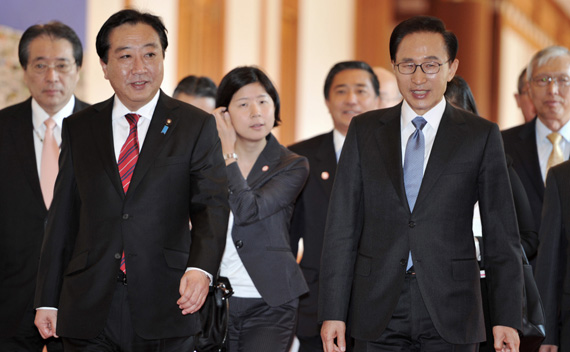Prime Minister Noda’s Visit to Seoul
More on:

Japan’s prime minister Yoshihiko Noda has just completed a two-day visit to South Korea. Noda personally insisted on carrying with him five volumes of the 1,205 royal scrolls confiscated under Japanese colonial rule. Noda spent time with South Korean president Lee Myung-bak, and the tenor of the meeting suggested that the two Northeast Asian neighbors were determined to get their relations back on a more positive footing.
Economic relations were the highlight. Japan and South Korea agreed to a currency swap arrangement that sought to convey to markets that South Korea’s delicate won would have Japanese backing. Likewise, there is talk of Korean encouragement for greater Japanese foreign direct investment, yet another way for Japan to signal its confidence in a vibrant Korean economy.
Yet the real accomplishment was restarting bilateral talks on a Japan-South Korea free trade agreement. The effort to outline an FTA began in December 2003, but talks were suspended in November 2004. Japan was sensitive about its competition in agriculture, while South Korea worried about its auto market. The passage of the Korea-U.S. Free Trade Agreement this month may make this an easier discussion.
Japan’s Democratic Party arrived in power with a commitment to addressing some of the longstanding sore points in the relationship with South Korea, including the return of royal records from Korea’s Joseon Dynasty (1392-1910). Moreover, public sensitivities in Korea during the 100th anniversary of Japan’s occupation of South Korea created a challenge for Tokyo in 2010.
Contemporary security concerns, however, also created new opportunities. Pyongyang’s use of force, first in the Cheonan sinking and then in the shelling of Yeonpyeong Island, raised new fears of a conflict on the peninsula. By December 2010, U.S. secretary of state Hillary Clinton met with South Korean foreign and trade minister Kim Sung-hwan and Japanese foreign minister Seiji Maehara to produce the strongest joint statement of cooperation by the three countries ever. This led to a visit to South Korea for the first time by Japanese minister of defense Toshimi Kitazawa in January 2011, and the agreement to work with South Korea on an Acquisition and Cross-Servicing Agreement that would allow Japanese cooperation in the case of a conflict on the peninsula.
Historical sensitivities re-emerged this year, however, related to the islands claimed by both countries. At one point, South Korea was so incensed that it refused entry to three Japanese conservative lawmakers who wanted to visit the region. When Prime Minister Noda was elected, he too drew Korean wrath for his past statements about the status of Japanese wartime leaders. South Korean ire seemed to wane, however, after Prime Minister Noda clearly stated that he would not reopen the Yasukuni Shrine issue.
This latest round of Japan-ROK summitry comes at an important time in the region’s diplomacy. South Korean president Lee has just returned from a tremendously successful state summit with President Obama, and there are the beginnings of signs of a new push to engage with North Korea on how to stabilize—and denuclearize—the Korean peninsula.
Japan too has great interest in restarting the trilateral conversation with Washington and Seoul. With U.S. secretary of defense Leon Panetta heading for both Tokyo and Seoul this week, Prime Minister Noda and President Lee’s ability to forge a positive and forward-looking agenda for the two U.S. allies will bring new energy to trilateral U.S.-Japan-ROK cooperation.
More on:
 Online Store
Online Store